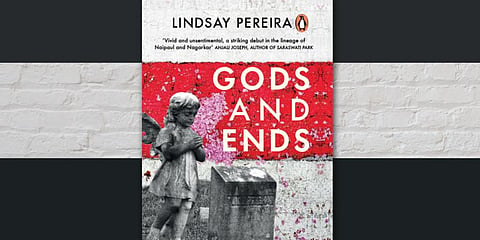

Lindsay Pereira’s award-winning debut Gods and Ends is a beautiful narrative of how lives are intertwined, even when there’s only disillusionment at the end of a dark tunnel. It’s the story of a community of Goans living in Obrigado Mansion in Orlem, a bustling Bombay neighbourhood of the late ’70s. Here, you wonder why Francisco, the grumpy landlord, could not move to Goa or why Philo Sequeira needs someone who could love her.
Even drunken lout Peter Vaz vies for empathy. The book was shortlisted for the 2021 JCB Prize for Literature and Tata Lit Live First Book Award. Written in a straightforward manner, devoid of any compassion, with dry wit running through its centre, Pereira’s book is a must-read.
Edited excerpts from an interview:
Gods and Ends has a multitude of characters, with disillusionment as the common thread. Why?
The disillusionment is a function of why they are forced to live together, and a reflection of who they are as marginalised members of society. They are brought together by virtue of belonging to a minority community, in accommodation that is presumably not of their choosing. The second reason for their disillusionment is economical, given that they have no means of leaving a prison they inadvertently make for themselves. To assume that people living on the margins are happy is naïve, because that jollity is often forced.
There are a few strands of hope in an otherwise painful book—Gavin, Kenny and Michelle. Why?
I think of them as characters who managed to break free, in some way, but not as glimmers of hope. Their need to escape is also an indictment of the place they leave behind, and it doesn’t necessarily free them of its clutches. It comes back to haunt them in its own way, specifically with Kenny.
Orlem is where you grew up. Were any characters inspired by real life?
I was born and raised there, and the characters were built using personalities and dialects that crossed my path during my formative years. I deliberately created typecasts of the community and set about trying to unravel them. These were personal histories of fictional people.
You have always wanted to dismantle the oft-repeated caricature of a Catholic community in Hindi cinema. Were you successful with this book?
A stereotype is often impossible to dismantle because it has a life of its own and gains strength or embellishment with every retelling. I simply wanted to present an alternative point of view, by looking at the human aspect of how these typecasts come into being. I am happy with how the book turned out. Whether or not I was successful will always be a matter of perspective.
What kind of response did you receive from your friends or from Orlem?
My friends have been extremely supportive, but to expect a response from Orlem would be optimistic. It isn’t the kind of place where a reading habit is encouraged, and I had no doubt the book wouldn’t be noticed or acknowledged by the residents in any way.
Does humour make it easy to consume your novel?
There is always humour in dark places if one looks hard enough and everything one does while writing is
intentional. How it is read or interpreted is out of one’s hands and I am okay with that.
Gods and Ends
By: Lindsay Pereira
Publisher: Vintage Books
Pages: 256
Price: Rs 599